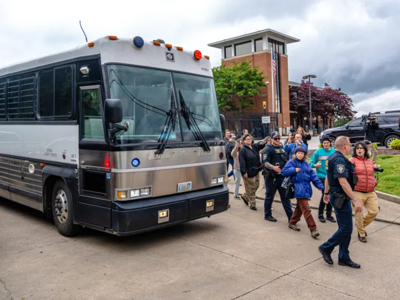May’s joint operation between Immigration and Customs Enforcement and state troopers was unlike anything seen before in Nashville. Tennessee Highway Patrol officers helped immigration enforcement agents arrest 196 people driving in South Nashville — home to many Latin American immigrants — and sent many of them off to a detention facility in Louisiana. Immigration advocates knew Trump would ramp up enforcement, especially in Democratic cities, but the volume of people taken away from the streets, and the surrounding confusion, created difficulties in the wake of the operation. And ICE and THP haven’t shared many details about the 196 detainees — most of whom had no criminal history.
“One of the things that really caught us off guard in May was just the complete lack of transparency from ICE,” says Allen Shao King, legal director of the Tennessee Immigrant and Refugee Rights Coalition. “We’re four months out from the May operation, and ICE still hasn’t released that list of the people that they’ve detained.”
TIRRC has been stressing the need for preparation with clients — what information to have ready, who to call if they get arrested, what to expect if a loved one is taken.
Immigration roundups terrorize South Nashville and take residents with no criminal history
Shao King says TIRRC learned that ICE was pushing detainees to sign documents waiving their right to an immigration hearing, fast-tracking their deportation. If they didn’t sign they could stay in detention for months and fight the case. Some detainees, with limited English, might not have fully understood what they were signing. Others — like those with medical needs — had to choose between leaving their new homes or languishing in a cell.
Shao King says there are cases in which people may need to make the decision that’s safest for themselves. However, TIRRC’s “know your rights” training will continue to reinforce that “you shouldn’t sign things just because someone hands it to you.”
More advice highlighted in TIRRC literature: Stay silent, document everything, and don’t open the door without seeing a signed warrant from a judge — beware of warrants written by the ICE agency itself.
Shao King says that while TIRRC hasn’t seen an uptick in further ICE activity yet, the nonprofit is bracing for it. The Scene previously reported that the Tennessee National Guard would be activated in September to assist ICE with administrative work.
And with the federal government ballooning ICE’s budget by $30 billion, “it’s pretty inevitable that some of that money will get used to increase enforcement effort,” says Shao King.
This year ICE’s aggression has threatened the public lives of immigrants. It’s less safe to go to work, and the agency no longer observes a policy preventing enforcement in sensitive locations like schools and churches.
In response, North Carolina advocacy group Siembra launched the Fourth Amendment Workplace campaign, training business owners about how to defend their and their employees’ rights when ICE agents visit. The campaign has reached 200 business and workplaces — including city employees of Durham — and is beginning to expand to Nashville through the efforts of labor advocacy organization Workers’ Dignity.
“It empowers people, and it reminds especially immigrants that regardless of their status, they have these rights because they’re workers,” says Daisy Ruiz Pérez, who is organizing the Fourth Amendment Workplace campaign in Nashville. Canvassers have reached out to roughly 16 businesses so far, with plans to continue outreach efforts. Ruiz Pérez says many managers and owners seem interested.
ICE mum on details about its ‘expanding mission’ through end of 2025
Brenda Pérez is the interim director of Workers’ Dignity, which celebrates its 15th anniversary on Sept. 20. She adds that the organization’s other campaigns against workplace mistreatment are still underway — and grabbing attention. “We’ve won a series of cases in the last few months that have been pretty visible,” she says.
Shortly after ICE’s May traffic sweeps, Workers’ Dignity helped construction workers fight wage theft at the downtown YMCA and at the Pinnacle development. (The latter case has been resolved, per Workers’ Dignity’s social media posts.) Many of the workers helped by Workers’ Dignity are Latino immigrants, and the organization stresses that working-class people are being most harmed by ICE’s policies.
“This isn’t a time to lower your head,” says Brenda Pérez, “to bow down. This is a time to stand up and demand that our rights be respected.”
The sentiment is echoed at TIRRC headquarters. Shao King was speaking to the Scene ahead of the organization’s InterNASHional Night Market, a food festival highlighting a diverse array of immigrant-owned businesses. And while TIRRC always has emergency plans in place — whether it’s a Democratic or Republican presidency — the coalition was eager to host the event and celebrate the community.
“One thing that the organization is trying to maintain is just that immigrants belong in Nashville, and they deserve a place to thrive, to show their food, their culture,” says Shao King. “We’re going to hold this event as best as we can, and we can’t let the threat of enforcement push everyone into hiding.”







